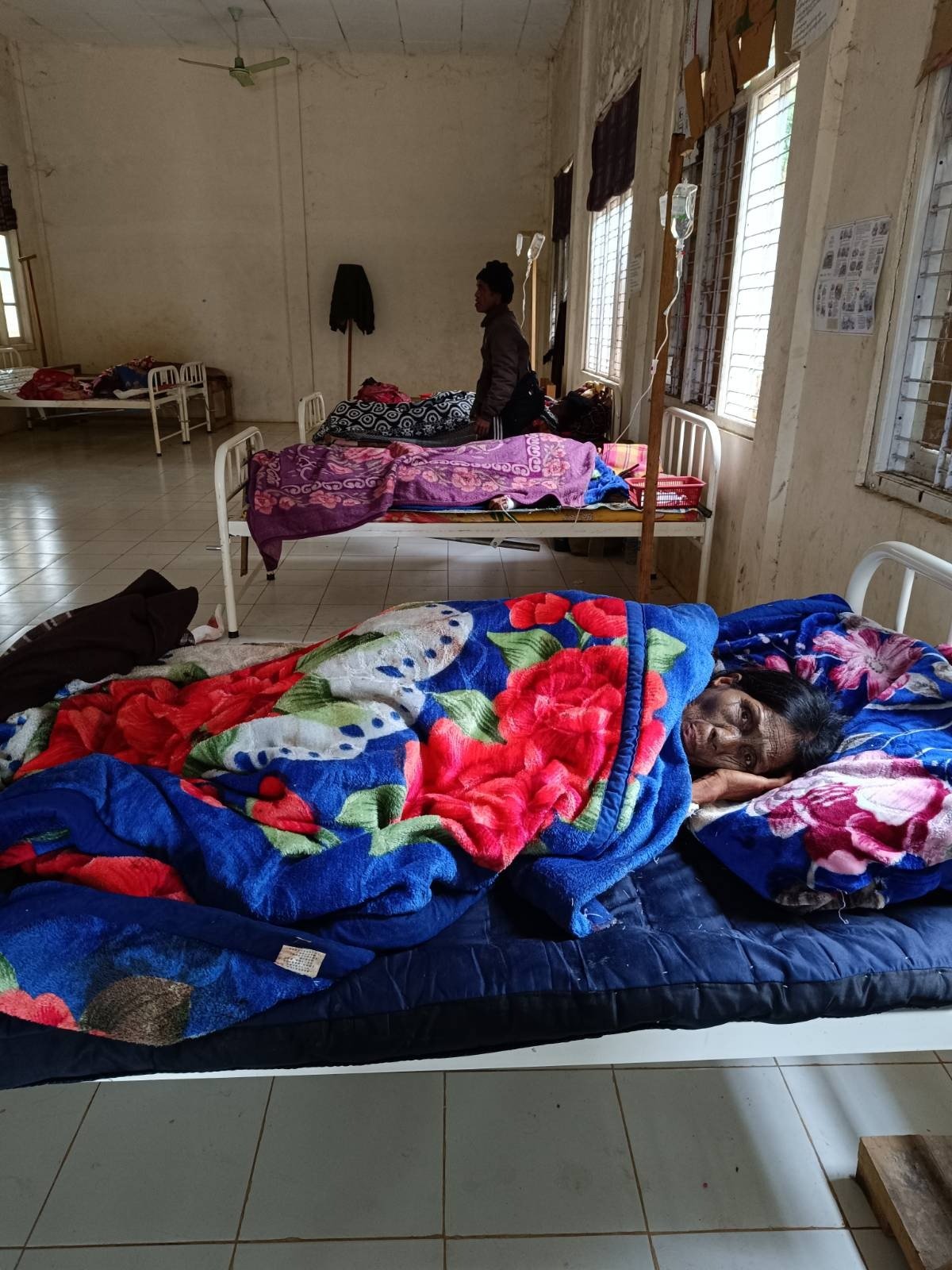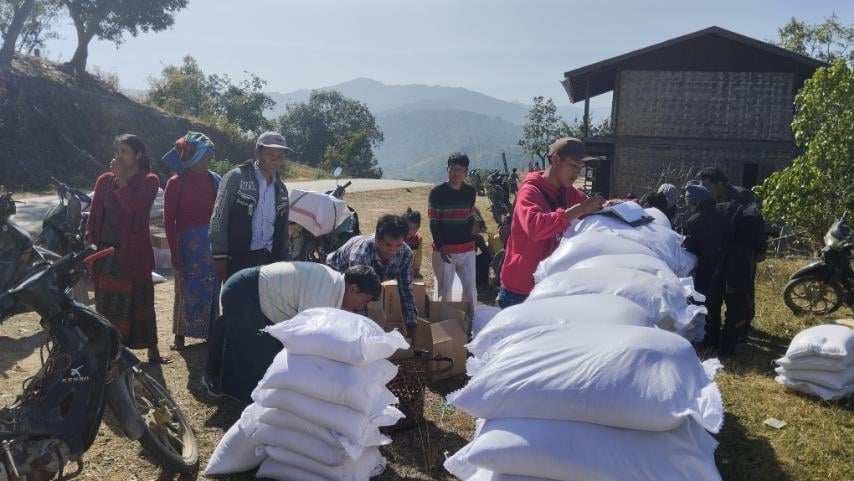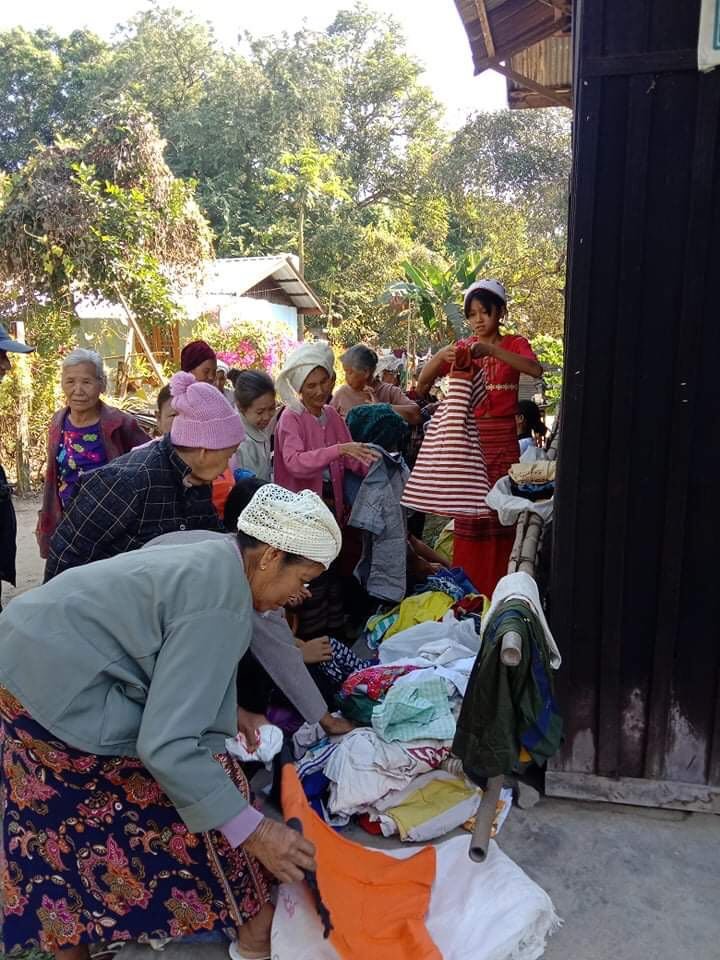Voices from the Shadows: Bringing Hope to Chin State’s Forgotten Families
Chin State has been shattered by conflict. What was once a quiet region, home to tightly-knit communities, has now become one of the most war-torn areas in Myanmar. It’s not just the fighting that has torn people’s lives apart, but the constant fear, the displacement, and the loss of everything that once provided stability. Families have been forced to flee their homes, often with just the clothes on their backs, leaving behind everything they know. The military’s relentless bombardments have leveled villages, and entire communities have disappeared into the mountains or across borders, trying to find safety wherever they can.
The situation for displaced people in Chin is bleak. Many have ended up in overcrowded camps or hidden deep in the jungle, surviving in conditions that are unimaginable to those who have never had to flee. People are living in makeshift shelters, sometimes nothing more than tarps strung between trees, with no protection from the elements. As the monsoon rains pour down, these flimsy shelters offer little refuge, leaving families soaked and cold, vulnerable to illness. The children, especially, are suffering. The rates of malnutrition among children are skyrocketing, with many families unable to find enough food to feed their little ones.
One of the most pressing issues is the lack of clean water. With natural water sources often contaminated by conflict or blocked by military forces, many people are forced to drink whatever water they can find—no matter how dirty or unsafe it may be. This has led to outbreaks of waterborne diseases like cholera and dysentery, which are proving deadly, particularly for young children. The situation is made worse by the almost complete collapse of healthcare services. Clinics have been destroyed, and even in areas where healthcare workers are still trying to operate, they don’t have the supplies they need to treat the sick and injured.
Thanks to the support of our generous donors who have contributed to Better Burma, local teams have been able to step in where government and international aid have failed. These local teams, who know the land and understand the dangers better than anyone, have taken on the dangerous task of delivering aid directly to those who need it most. One of the most significant successes has been the distribution of water filters to families in some of the most remote areas of Chin. These filters, while simple, have provided lifesaving clean water to hundreds of households. It’s a small intervention with a massive impact, drastically reducing the number of waterborne illnesses in the camps and giving families one less thing to worry about as they try to survive day by day.
The teams have also worked tirelessly to deliver food to families who are struggling with hunger. In places like Kanpetlet and Paletwa, where the conflict is especially fierce, food shortages are a daily reality. Markets have been destroyed, and even when food is available, the military often blocks it from getting to the people. Local aid workers have navigated dangerous paths, avoiding landmines and military checkpoints, to bring rice, lentils, and dried fish to the people hiding in the hills. The food isn’t enough to make them feel secure, but it’s enough to keep them alive for now.
What often goes unnoticed, though, are the emotional and psychological tolls this conflict is taking on the people of Chin. Imagine what it must be like to live in constant fear—never knowing when the next airstrike will hit or whether you’ll be able to find food tomorrow. Families are torn apart, with many children separated from their parents during evacuations. Some children are found wandering alone, lost and traumatized, with no idea where their families are or whether they’re even alive. Local teams have made it a priority to reunite families whenever possible, though the sheer number of displaced people makes this an almost impossible task. Orphaned children, too, are a growing concern, as more and more lose their parents to the violence or become separated during chaotic escapes from the fighting.
Injuries from landmines are another devastating part of life in Chin State. The military has deliberately placed these mines along civilian paths, knowing full well that they will harm innocent people. Many victims are children who stumble upon the mines while playing or walking through fields. Local medics, supported by our donation fund, have been working around the clock to save these victims, but with limited supplies and no access to proper surgical facilities, the outcomes are often grim. Makeshift medical camps are doing what they can with gauze, basic painkillers, and antibiotics, but without proper medical care, many survivors face life-long disabilities, and others don’t survive at all.
The medics are also battling an epidemic of diseases that would be preventable in normal circumstances. The lack of basic healthcare means that diseases like malaria, dengue fever, and respiratory infections are claiming lives at an alarming rate. Pregnant women, too, face unimaginable risks, with many delivering their babies in unsafe, unsanitary conditions. These brave local medics are doing everything they can, but the demand for care far outstrips the supplies they have.
In the face of all this hardship, the local teams supported by Better Burma have become a lifeline for the people of Chin. Their courage and determination to keep going, despite the incredible dangers, is what keeps families alive. But they can’t do it alone. The resources are dwindling, and the need is only growing. More families are arriving at the camps every day, more children are going hungry, and more people are getting sick. What these teams need most is continued support—donations that will allow them to buy the supplies they need to keep these people alive.
If you’ve already given, your support has made a difference—there’s no doubt about that. But the work is far from over. The people of Chin need us to stand with them as this crisis continues to unfold. Every donation, no matter the size, goes directly to saving lives.








